Book 3Unit 1单词导学案
新外研版七年级英语下册导学案(M3-Unit 1讲义)

Module 3 Making PlansUnit 1 What are you going to do at the weekend?第一课时一、学习目标(1) 理解对话并能用所给信息谈论周末计划。
(2) 掌握本单元的单词,学会用be going to do 句型。
二、学习重点go over ,on , nobody, at , nothing, silly, fantasticWhat are you going to do…? I’m going to …Are you going to…? Yes ,we are./ No, we aren’t.三、学习难点be going to do sth. ;would like的用法课前预习一、使用说明与学法指导1、必须掌握重点单词。
2、预习要注意:(1)5分钟完成单词的学习,要求读音正确。
(2)15分钟完成课文的预习,所有生单词都画出来并标注汉语,疑点做出标记,并找出导学案上的词组和句子。
3、将预习中不能解决的问题标出来,并写在我的疑问处。
二、教材助读请同学们预习课文的基础上写出下列词组,并在书本上将这些词组画线。
查询我的电子邮件______________复习功课________________上钢琴课______________________看电影__________________野餐________________________帮助做家务_________________在周末______________________在周六的早上_______________呆在家里____________________ 别傻了_____________________三、预习自测题1.翻译下列单词picnic________ housework ______ else ________ nobody _______nothing_______ fantastic________2.翻译下列短语Do homework_________ help with the housework __________see a movie___________ Check emails____________have a piano lesson________ have a picnic___________Go over lessons___________ a fantastic weekend______________四、我的疑问_________________________________________________________________课内探究1、T: What day is it today? S:Today is Friday/...T:What's the weather like?S:It's sunny/...T:What are you going to do at the week end? S:I'm going to have a picnic/...2、利用句型,根据实际情况回答问题1、—What are you going to do this Sunday?—I'm going to...2、—What is your mother going to do at the weekend? —She is going to ...3、—what are your friends going to do at the weekend?—They are going to...3、听录音掌握大意并完成Activity4.(一)1、听力练耳Listen and match (听录音,连线组成短语,然后朗读这些短语,背诵)2、Write the phrases in Activity1 and the picture.(Activity2)(二)对话处理读前听Listen to the dialogue, and answer the questions.1、Is Daming going to check his email?2、Is Betty going to a party at a friend’s home on Saturday evening?3、What is Daming going to do on Saturday afternoon?听后读:最大声、最准确的朗读对话一遍,说一说Betty和Daming的计划。
Unit 1 Will people have robots导学案1

Unit 1 Will people have robots?导学案一、学习目标、重点、难点学习目标: 1.will引导的一般将来时肯定与否定形式对将来发生的事情进行预测。
2.Ther.b.句型的一般将来时.3.mor..les..fewe.的用法.4.学习一般将来时态的相关知识, 学会对未来进行预测.5.通过时间对比复习一般过去时态、一般现在时态, 巩固一般将来时.学习重难点: 1.will构成一般将来时态的句式。
2.Ther.b.句型的一般将来时态。
3.mor..les..fewe.的用法。
4.准确表述将要发生的事情。
二、知识概览图三、新课导引To ask the students some questions, such as, do you want to live on the moon? Can you guess what will happen in ten years? Then collect the students’ answers and say something about their predictions.四、教材精华1.D.yo.thin.ther.wil.b.robot.i.people’.homes.你认为在人们家里将会有机器人吗?(1)本句是一个含有宾语从句的复合句, 省略了that, there will be robots in people’s homes 作think的宾语, 为宾语从句。
Do you think the boy will buy a few new computer games?你认为这个男孩会买一些新电脑游戏吗?(2)从句there will be robots in people’s homes为there be 句型的一般将来时, 其结构为“There + will be +主语+其他”, 表示“将会有……”。
There won’t be any pollution some day.将来有一天会没有污染。
2020年新人教版必修三《Unit 1 Festivals and Celebrations》单元教案(附导学案)1

Unit 1 Festivals and CelebrationsListening and speaking & Listening and talking【教材分析】本板块的活动主题是“谈论节日活动”(Talk about festival activities),主要是从贴近学生日常生活的角度来切入“节日”主题。
学生会听到发生在三个国家不同节日场景下的简短对话,对话中的人们正在参与或将要亲历不同的庆祝活动。
随着全球化的进程加速,国际交流日益频繁,无论是国人走出国门还是外国友人访问中国,都已成为司空见惯的事情。
因此,该板块所选取的三个典型节日场景都是属于跨文化交际语境,不仅每组对话中的人物来自不同的文化背景,对话者的身份和关系也不尽相同。
【教学目标】1. Master the new words related to holiday: lantern, carnival, costume, dress (sb) up, march, congratulation, congratulate, riddle, ceremony, samba, make-up, after all.2. To understand the origin of major world festivals and the activities held to celebrate them and the significance of these activities;3. Improve listening comprehension and oral expression of the topic by listening and talking about traditional festivals around the world;4. Improve students’ understanding of the topic by watching pictures and videos about different traditional festivals around the world;5. Review the common assimilation phenomenon in English phonetics, distinguish the assimilated phonemes in the natural language flow, and consciously use the assimilation skill in oral expression.【教学重难点】Importance:1. Guide students to pay attention to the attitude of the speaker in the process of listening, and identify the relationship between the characters;2. Inspire students to use topic words to describe the festival activities based on their background knowledge.Difficulties:In the process of listening to the correct understanding of the speaker’s attitude, accurately identify the relationship between the characters.【课前准备】1. To understand the origin of traditional festivals in the world, the celebration activities (customs) of these festivals and the meaning of these activities;2. Talk about holiday celebrations;3. Preview: understand the new words according to the context.【教学过程】Step 1 Lead-inTeachers talk about the world’s traditional festivals, such as the Lantern Festival in China, adults’ day in foreign countries, carnivals and so on.Step 2 Watching and talkingActivity 11. Teacher lets Ss look at some pictures about festival activities. During talking about these activities, teacher can add some background knowledge about festivals.Questions:①What festivals do the pictures show us?②In which country do you think people celebrate each festival?③How do people celebrate each festival?2. Ask sb to choose some words or phrases from the box to celebrate eachfestival.3. Teacher can show students how to use these word blocks and learn to describeholiday activities in groups. For example:On the Coming-of-Age Day, young girls in Japan would wear traditional costumes.One of the most important activities during the Lantern Festival is to guess riddles.During the Rio Carnival, you can watch wonderful samba dances.4. The teacher asks students to report the results of the group lecture. Ask thesequestions:①What do people do to celebrate the Chinese Lantern festival?②Who will celebrate Coming-of-Age Day? What do they do to celebrate it?③What do you expect to see if you go to the Rio Carnival?5. Learn some words and phrases in the box.Step 3 ListeningActivity 21. Teacher asks sb to read “Listen for relationships”, In pairs, discuss how to identify relationships between people based on their tone and content. The teacher can provide the following questions to inspire students to discuss.①What does a tour guide usually say to a tour group? What expressions arefrequently used?②What questions does an interviewer usually ask during an interview?③What would a reporter say or do if he/she wants to interview a tourist?④How do friends usually talk?2. Some group representatives are invited to communicate and speak in class.3. Teacher plays the listening tape for students to listen to and write the order of the conversations next to the names of the festivals.4. Play the tape again, students match each conversation with the relationship between the speakers.5. Check the answers with class.Activities 3-41. Teacher asks students to look at the tasks and requirements of activity 3. Then read the main ideas of the three dialogues. (Guide the students to guess and fill in the words according to the context. Let the students analyze the English syntactic structure based on the meaning of the sentence and make reasonable inferences.)2. Teacher plays the tape for the second time. After listening to the tape, students discuss the answers in pairs. Then the class communicates and checks the answers.3. Teacher lets students listen to the tape for the third time (Before the teacher plays the recording for the third time, the teacher should prepare the students to takenotes and remind them to catch key words, especially phrasal verbs.).Step 4 SpeakingActivity 51. Lead the dialogue by asking questions. Let students understand how to discuss their favorite festivals and give their reasons.E.g.,Conversation 1T: Which of the three festivals do you like best?S1: I think the Coming-of-Age Day is the most interesting.T: Why is it your favourite?S1: Because I like to see women dressed up in their colorful traditional kimonos.Conversation 2T: Which of the three festivals attracts you most?S2: The Chinese Lantern Festival.T: I suppose you like yuanxiao, the sweet dumplings.S2: Not only that. I especially like guessing riddles and I’m good at it.2. Follow the example of the conversation in activity 5 and work in pairs to discuss your favorite holiday and explain why. After the discussion, the teacher asks some groups to show the dialogue.Step 5 ActingOne student plays the role of a journalist. The other three students play the roles of the characters in the listening dialogue. They are the Japanese girl attending the coming-of-age ceremony, the girl attending the Rio carnival, and the tourist visiting China. The following questions can be used in the interview:①What is the purpose of this festival?②How do you usually celebrate this festival?③What do you like best about this festival?Step 6 Pronunciation1. Help students recognize speech assimilation.(1)Teacher plays the recording of activity 1 and asks the students to pay attention to the pronunciation changes of bold letters while listening.(2)Teacher organizes students to carry out activities in pairs: the teacher plays the recording, one person in the group reads after the words and phrases in activity 1, the other person compares the pronunciation of the recording with that of his partner carefully, and points out the pronunciation problem of his/her partner if there is any difference. Then switch roles, listen to the tape again and complete the same task.2. Let students imitate and read.(1)Teacher guides students to understand the requirements of activity 2. Before listening to the tape, the teacher asks the question for students to think: “How does your pronunciation change while reading the sentences?”(2)Teacher plays the tape for the first time. The students read after the sentences in activity 2.(3)Teacher plays the tape for the second time, the students repeat the sentences again, and then discuss with their partners the differences between the pronunciation of the bold consonants in words and the pronunciation in sentences, and describe the phonetic assimilation in the flow.(4)Teacher asks different students to read the six sentences of activity 2 and report the result of the discussion on phonetic assimilation. The teacher supplements and corrects the students’conclusion, explains it appropriately, and writes the assimilation pronunciation in these sentences on the blackboard or presents it to the students through the courseware.Step 7 Listening and TalkingActivity 61. Learn the new words about the festivals.2. Look at the pictures and predict what festival Song Lin and Max are going to talk about.3. Listen and answer the questions.①What festival is Max talking about?②What did Max’s mother cook?③What did Max do during the festival?④What did Max and his family do during and after the dinner?⑤What was the best part of the festival?4. Listen again and check the answers with class.Answers:①Christmas experiences.②Roast turkey, mashed potatoes and Christmas pudding, …③He helped decorate the Christmas tree and put presents under it, then helped his mum prepare for the family dinner.④During dinner they shared stories and told jokes, afterwards they played games, opened their presents.⑤The best part was opening their presents on Christmas morning.5. Listen again and tick the phrases that Max or Song Lin uses. Then check the answers with class.6. Have a conversation with the help of these questions:①What is the recent festival you have had?②How did you celebrate it?③How do you feel about the festival? Why?Step 8 Homework1)Read the passage again and understand the food culture from a cross-cultural perspective.2)Remember the new words and learn the usages of them.【教学反思】1、通过本节内容学习,学生能否理解发生在三个国家不同节日场景下的简短对话,对话中的人们正在参与或将要亲历不同的庆祝活动;2、通过本节内容学习,学生能否辨别对话中人物之间的关系;3、通过本节内容学习,学生能否掌握听力训练中的听力策略。
仁爱科普版英语八年级上册导学案:Unit3Topic1
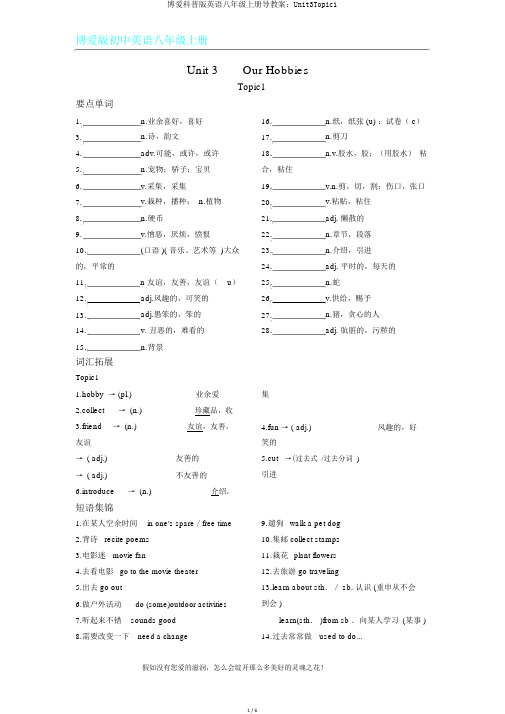
博爱版初中英语八年级上册Unit 3Our HobbiesTopic1要点单词1. n.业余喜好,喜好16. n.纸,纸张 (u) ;试卷( c)3. n.诗,韵文17. n.剪刀4. adv.可能,或许,或许18. n.v.胶水,胶;(用胶水)粘5. n.宠物;骄子;宝贝合,粘住6. v.采集,采集19. v.n.剪,切,割;伤口,张口7. v.栽种,播种; n.植物20. v.粘贴,粘住8. n.硬币21. adj. 懒散的9. v.憎恶,厌烦,愤恨22. n.章节,段落10. (口语 )( 音乐、艺术等 )大众23. n.介绍,引进的,平常的24. adj. 平时的,每天的11. n 友谊,友善,友谊(u)25. n.蛇12. adj.风趣的,可笑的26. v.供给,赐予13. adj.愚笨的,笨的27. n.猪,贪心的人14. v. 丑恶的,难看的28. adj. 肮脏的,污秽的15. n.背景词汇拓展Topic11.hobby → (pl.)______________ 业余爱2.collect→ (n.)珍藏品,收3.friend→ (n.)友谊,友善,友谊→( adj.)_______________ 友善的→( adj.)_______________ 不友善的6.introduce→ (n.)介绍,短语集锦1.在某人空余时间in one's spare/free time2.背诗recite poems3.电影迷movie fan4.去看电影go to the movie theater5.出去 go out6.做户外活动do (some)outdoor activities7.听起来不错sounds good8.需要改变一下need a change 集4.fun → ( adj.)_______________风趣的,好笑的5.cut→(过去式/过去分词)____________引进9.遛狗walk a pet dog10.集邮 collect stamps11.栽花plant flowers12.去旅游 go traveling13.learn about sth./ sb. 认识 (重申从不会到会 )learn(sth. )from sb .向某人学习(某事 ) 14.过去常常做used to do...15. 养宠物 keep pets16. 多于,超出 more than17. 以 ...开始 start with18. 把 ...沾到 ...上 stick... to...19. 删除,剪裁cut out20. 和 ...分享 ... share with21. 向某人供给某物provide sb.with sth.=provide sth for sb.在某人的生活上,在某人一世中in one ’s life/lives22. 沐浴 take/have a bath洗淋浴 take/have a shower23. 能否 whether or not24. 带某人出去漫步 take sb out for a walk句型集锦1.What do you often do?在你的业余时间你常常做什么?2. What’ s your hobby?你的业余喜好是什么?I ’ m a movie fan. I go to the movie theater a lot.I am interested in playing basketball.I love singing and playing the guitar.I enjoy dancing to music.I prefer playing soccer.I am fond of acting.I like reciting poems.3. Why not go out and? 为何不出去做一些户外活动呢?4.It must be great fun.它必定很风趣5.I collect baseball cards.But Ibasketball.我过去采集棒球卡。
外研版(三起点)六年级英语上册《Module3__Unit1__第1课时导学案》
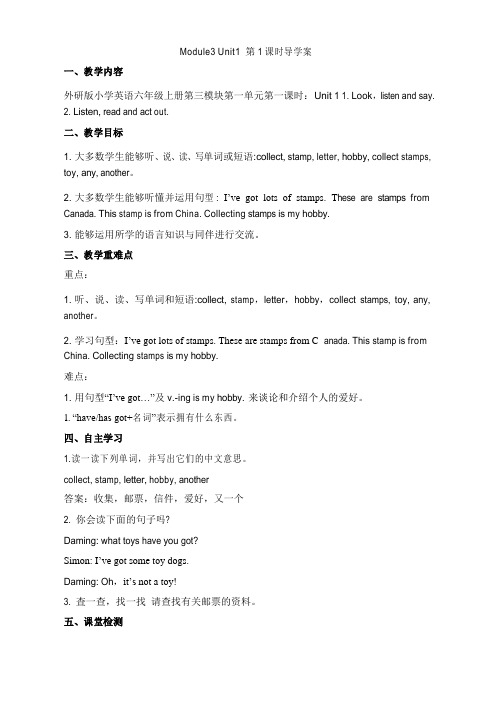
Module3Unit1第1课时导学案一、教学内容外研版小学英语六年级上册第三模块第一单元第一课时:U nit1 1.Look,listen and say.2.Listen,read and act out.二、教学目标1. 大多数学生能够听、说、读、写单词或短语:collect,stamp,letter,hobby,collect stamps, toy,any,another。
2. 大多数学生能够听懂并运用句型: I’ve got lots of stamps.T h ese are stamps from Canada.This stamp is from China.Collecting stamps is my hobby.3. 能够运用所学的语言知识与同伴进行交流。
三、教学重难点重点:1. 听、说、读、写单词和短语:collect,stamp,letter,hobby,collect stamps,toy,any, another。
2. 学习句型:I’ve got lots of stamps.These are stamps from C anada.This stamp is from China.Collecting stamps is my hobby.难点:1. 用句型“I’ve got…”及v.-ing is my hobby.来谈论和介绍个人的爱好。
1.“have/has got+名词”表示拥有什么东西。
四、自主学习1.读一读下列单词,并写出它们的中文意思。
collect, stamp,letter,hobby,another答案:收集,邮票,信件,爱好,又一个2.你会读下面的句子吗?Daming:what toys have you got?Simon:I’ve got some toy dogs.Daming:Oh,it’s not a toy!3.査一查,找一找请查找有关邮票的资料。
新人教版英语必修二book3 unit 3词汇导学案(学生使用)
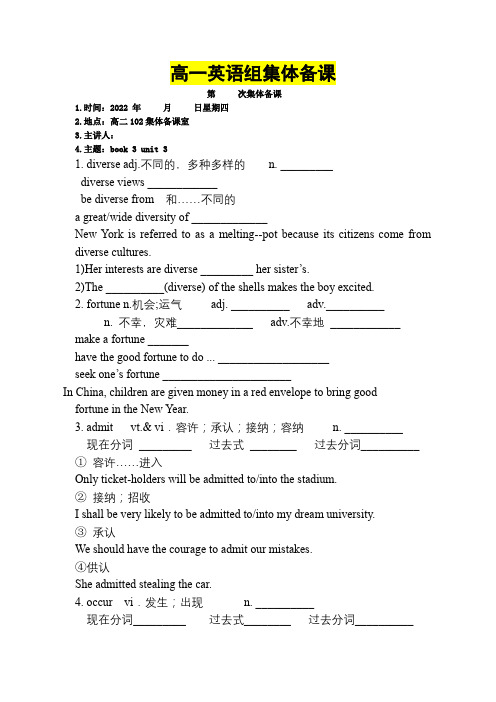
高一英语组集体备课第次集体备课1.时间:2022 年月日星期四2.地点:高二102集体备课室3.主讲人:4.主题:book 3 unit 31. diverse adj.不同的,多种多样的n. _________diverse views ____________be diverse from 和……不同的a great/wide diversity of _____________New York is referred to as a meltingpot because its citizens come from diverse cultures.1)Her interests are diverse _________ her sister’s.2)The __________(diverse) of the shells makes the boy excited.2. fortune n.机会;运气adj. __________ adv.__________n. 不幸,灾难_____________ adv.不幸地____________ make a fortune _______have the good fortune to do ... ___________________seek one’s fortune ______________________In China, children are given money in a red envelope to bring goodfortune in the New Year.3. admit vt.& vi.容许;承认;接纳;容纳n. __________现在分词_________ 过去式________ 过去分词__________①容许……进入Only ticketholders will be admitted to/into the stadium.②接纳;招收I shall be very likely to be admitted to/into my dream university.③承认We should have the courage to admit our mistakes.④供认She admitted stealing the car.4. occur vi.发生;出现n. __________现在分词_________ 过去式________ 过去分词__________①It occurs/occurred to sb. to do sth.It occurred to her ________________ (给警察打电话)②It occurs/occurred to sb. that...It occurred to him that had an important conference to attend the next morning.一句多译他忽然想起他把钥匙忘在办公室里了。
【导学案】Unit 1 Lesson 3 So Close Yes So Far(教师版)
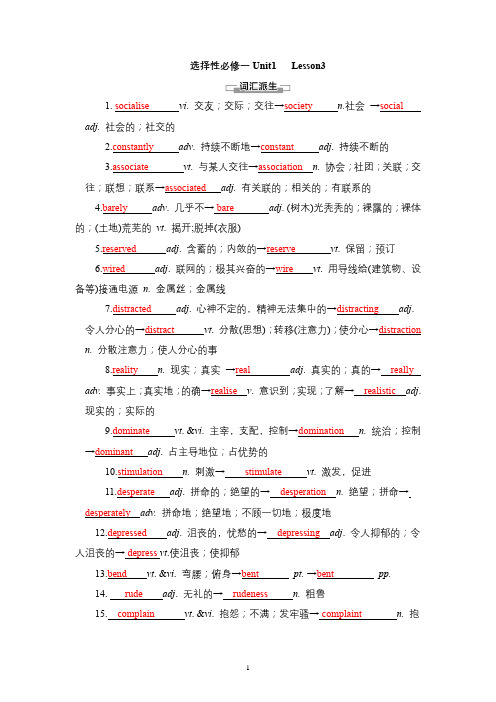
选择性必修一Unit1 Lesson31. socialise vi. 交友;交际;交往→society n.社会→social adj. 社会的;社交的2.constantly adv. 持续不断地→constant adj. 持续不断的3.associate vt. 与某人交往→association n. 协会;社团;关联;交往;联想;联系→associated adj. 有关联的;相关的;有联系的4.barely adv. 几乎不→ bare adj. (树木)光秃秃的;裸露的;裸体的;(土地)荒芜的vt. 揭开;脱掉(衣服)5.reserved adj. 含蓄的;内敛的→reserve vt. 保留;预订6.wired adj. 联网的;极其兴奋的→wire vt. 用导线给(建筑物、设备等)接通电源n. 金属丝;金属线7.distracted adj. 心神不定的,精神无法集中的→distracting adj. 令人分心的→distract vt. 分散(思想);转移(注意力);使分心→distraction n. 分散注意力;使人分心的事8.reality n. 现实;真实→real adj. 真实的;真的→really adv.事实上;真实地;的确→realise v. 意识到;实现;了解→realistic adj. 现实的;实际的9.dominate vt. &vi. 主宰,支配,控制→domination n. 统治;控制→dominant adj. 占主导地位;占优势的10.stimulation n. 刺激→stimulate vt. 激发,促进11.desperate adj. 拼命的;绝望的→desperation n. 绝望;拼命→desperately adv.拼命地;绝望地;不顾一切地;极度地12.depressed adj. 沮丧的,忧愁的→depressing adj. 令人抑郁的;令人沮丧的→ depress vt.使沮丧;使抑郁13.bend vt. &vi. 弯腰;俯身→bent pt. →bent pp.14.rude adj. 无礼的→rudeness n. 粗鲁plain vt. &vi. 抱怨;不满;发牢骚→ complaint n. 抱怨16.appointment n. 约定;约会→appoint vt. 任命;委任;安排,确定(时间、地点)17.alcoholic n. 酗酒者,嗜酒成瘾者adj. (含)酒精的→ alcohol n. 酒精★课标词▲高频词▲★1. associate【用法归纳】(1)vi.交往,(尤指)混在一起associate with sb. 与某人交往,与某人混在一起▶I don’t like you associating with those people.我不喜欢你和那些人混在一起。
高一英语英语必修三Unit1导学案及练习题

高一英语英语必修三Unit1导学案及练习题本资料为woRD文档,请点击下载地址下载全文下载地址www.5ykj.com 第1课时Talkaboutfestivals:sometraditionalchineseFestivalsSpringFestival春节QingmingFestival清明节DoubleNinthFestival重阳节DoubleSeventhFestival七夕节mid-AutumnFestival中秋节LanternFestival元宵节(TheyuanxiaoFestival)DragonBoatFestival端午节*Festivalsaremeanttocelebrateimportantevents.*what’syourfavoriteholidayoftheyear?*whatfestivalsorcelebrationsdoyouenjoyinyourcityortown?*Doyoulikespendingfestivalswithyourfamilyorwithyour friends?*whatpartofafestivaldoyoulikebest——themusic,thethingstosee,thevisitorthefood?*Festivalsandcelebrationsofallkindsareheldeverywher e.*Theylitfiresandmademusicbecausetheythoughtthesefes tivalswouldbringayearofplenty.*Somefestivalsareheldtohonorthedeadorsatisfyandplea setheancestors.*Festivalscanbeheldasanhonortofamouspeopleorthegods.*Themostenergeticandimportantfestivalsaretheonestha tlookforwardtotheendofwinterandtothecomingofspring.*Festivalsletusenjoylife,beproudofourcustomsandforg etourdailylifeforalittlewhile.第2课时【自主学习】单词预习学案.庆典,庆祝n._________v.__________庆祝严寒的结束__________________________,________________2.起源,由来n._________HermotherisFrench__________宗教n._________adj._______宗教信仰__________3.到达n.________v._____________幸存,生还n._____________v.____________4.独立n.____________adj.___________从英国人那儿获得独立______________5.盼望春节的到来______________________________Specialattentionshouldbepaidto__________thewords.6.与家人玩得开心_________取笑某人,拿某人开玩笑___________Ididit_____________搞某人的恶作剧____________7.必要性,需要;必需品n._____必需的adj._______生活必需品______8.守信用,履行诺言_____________________食言____________9.道歉v.__________n.___________因某事向某人道歉__________Pleaseacceptmy______________forthatmeto___________tothatfellow?Noway!He_________________forsteppingonmyfoot.0.淹没,溺死v.__________pt___________pp____________adrowningman_____________adrownedbody_____________drownoneselfinwork__________drownone’ssadnessinwine__________1.哭泣,流泪v._____________pt___________pp_________He______________hisfailure.扫v._________________pt._____________pp._________________【合作探究】2.用dress,clothes,clothing,cloth适当形式填空)The________needwashing,canyouhave_______washed?2)Theshopsellschildren’s___________only.3)Pleasecoverthetablewitha___________.4)____________________________5)Peopleareexpectedtowearformal__________inawedding.3.inmemoryof;incelebrationof;inhonourof;intheshapeo f,insearchof填空)Theboyswent_________________somethingtoeat.2)Hewroteapoem_________________hiswife.3).manypeoplejoinedthem______________4).Peopleeatfood_________skullsonfestivalofthedead.5)Aceremonywasheld_______________thosekilledintheea rthquake【当堂检测】)Thegreatflood_________________________manyvill ages.那次大洪水把许多村子都淹没了。
pep新人教版小学三年级下册英语第一单元导学案

'课题Unit 1总课时6Lesson 1年级三年级主备人:林惠卿 ............课型会话教学班级教学方法交际法、游戏法等学习准备教师准备教材相配套的教学录曰带学生准备单词卡片知识目标能听说单词Welcome back, boy,and,girl,we,new,friend,today,from学习目标能力会标用句子I' II >m /I r m from介绍自己及自己的情况。
创设情景,小组合作学习中巩固运用句型和单词。
情感态培养学生尊重他人的良好品质。
重占八能够流利地介绍自己的姓名及出生地。
难占八熟练运用We have two new friends today. 这个句型。
导学过程导学过程二次备课自、课前复习:主英语打招呼Welcome back to schoo!复习巩固学过的内容,学二、课前预习:习制作单词编对话运用句子:1 ' m /I ' m from介绍自己.—、全体学生呼英语励志口号:Kn owledge is power .4、热身、复习:交师生冋候,用英语打招呼Welcome back to school!复习巩固学过的内容,创设英语学习氛围。
三、小班内查练:1 >I m ......I ' m from China.(手中举起中国国旗)流And you?Hi! I ' m Amy.I 'm from America.利用头饰做自我介绍2、四、导入新课,板书课题。
展示本课学习目标,学生齐读本课学习目标。
3、五〕、导入并指导学习新的内容:展1.教师借助Amy和Zhang Peng的头饰向学生介绍引出单词:boy,girl friend。
2.利用单词卡片教学生认读单词:boys and girls, today, newfrie ndsC3.教师带头饰自我介绍:Hi,I ' m Amy. I' m from the UK.借助国旗引导学生认识英国的英语名称。
高中英语必修三unit1教案

高中英语必修三unit1教案教学目标1. 让学生掌握本单元的核心词汇和表达方式。
2. 培养学生通过语境理解词义和句意的能力。
3. 提高学生的听说读写综合运用能力,尤其是口语交际能力。
4. 引导学生了解和认识中西方文化差异,培养跨文化交际意识。
教学重点与难点- 重点:核心词汇的正确使用,以及日常交流中的常见表达。
- 难点:理解和运用抽象词汇进行实际交流。
教学准备- 教材内容熟悉:确保对课本内容有深入的理解。
- 多媒体课件:准备相关的图片、音频和视频材料以辅助教学。
- 互动活动设计:制定小组讨论、角色扮演等互动环节的计划。
教学过程导入阶段(Warming u)- 通过展示与主题相关的图片或视频,激发学生的兴趣。
- 提问学生关于主题的前置知识,为新课内容做铺垫。
呈现阶段(resentation)- 利用T呈现新单词和短语,结合例句讲解其用法。
- 教师领读单词和短语,注意发音和语调。
- 播放课文录音,让学生跟读,注意模仿语音语调。
练习阶段(ractice)- 分组练习对话,鼓励学生运用新学的表达进行交流。
- 完成课本上的练习题,巩固新知识点。
- 通过角色扮演等活动,让学生在情境中使用英语。
应用阶段(Alication)- 小组讨论相关话题,如文化交流的重要性等。
- 模拟真实场景,如在机场、酒店等情境下的交际对话。
总结与反馈(Summary and feedack)- 总结本节课学习的核心内容。
- 提供反馈,指出学生在学习过程中的优点和需要改进的地方。
作业布置- 背诵本单元的核心词汇和短语。
- 完成一篇关于文化差异的小短文,运用所学知识。
教学反思- 分析本节课的教学效果,记录学生的学习情况。
- 思考如何改进教学方法,提高学生的学习效率。
人教版PEP三年级上英语Unit1-Unit6导学案
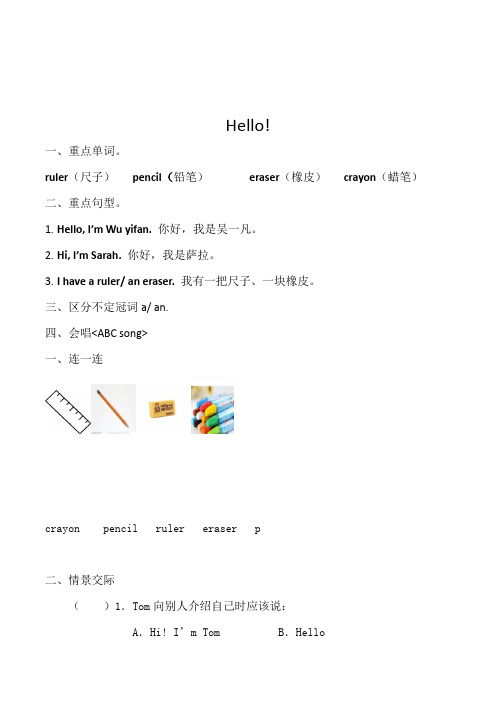
Hello!一、重点单词。
ruler(尺子)pencil(铅笔)eraser(橡皮)crayon(蜡笔)二、重点句型。
1.Hello, I’m Wu yifan. 你好,我是吴一凡。
2.Hi, I’m Sarah. 你好,我是萨拉。
3.I have a ruler/ an eraser. 我有一把尺子、一块橡皮。
三、区分不定冠词a/ an.四、会唱<ABC song>一、连一连crayon pencil ruler eraser p二、情景交际()1.Tom向别人介绍自己时应该说:A.Hi! I’m Tom B.Hello()2.别人向你打招呼时应该说:A.Goodbye B.Hello()3.别人向你道别时应该说:A.Goodbye B.Hello三、小小翻译家1.Hello! I’m Wu Yifan.2.Hi! I’m Miss White.3.I have a book.4. Show me your eraser.四、选出下列单词的正确意思()school A铅笔 B学校 C尺子()ruler A铅笔 B橡皮 C尺子()eraser A蜡笔 B钢笔 C橡皮()crayon A铅笔 B蜡笔 C尺子()pencil A铅笔 B钢笔 C橡皮五、补全对话A:Hello!B: .I’m Tom六、我会背。
Hello, I’m Wu yifan. 你好,我是吴一凡。
Hi, I’m Sarah. 你好,我是萨拉。
I have a ruler/ an eraser. 我有一把尺子、一块橡皮。
七、我会唱。
ABCDEFG, HIJKLMN, OPQ, RST, UVWXYZ. XYZ,now you see, I can say my ABCs.Hello!五、重点单词。
pen(钢笔)pencil box(铅笔盒)bag(包)book(书)六、重点句型。
4.What’s your name? 你叫什么名字?5.My name’s John. 我叫约翰。
Unit1 -Recycle 1 (导学案)人教PEP版英语五年级上册

Unit 1 - Recycle 1 (导学案) 人教PEP版英语五年级上册一、学习目标1.理解和掌握单词recycle, waste, plastic, paper, metal, glass, cloth, cardboard的含义;2.学会发出和响应Can you help me?的请求;3.熟悉和掌握问候语和告别语。
二、学习重点和难点1.单词recycle, waste, plastic, paper, metal, glass, cloth,cardboard的词义;2.发出和响应请求Can you help me?;3.熟悉和掌握问候语和告别语。
三、学习内容1. 单词学习(1)recycle/recycle/ 是一个动词,意思是“回收利用”。
例如:We should recycle waste paper.(2)waste/waste/ 是一个名词,意思是“废物”。
例如:Don’t throw the waste on the ground.(3)plastic/plastic/ 是一个名词,意思是“塑料”。
例如:My schoolbag is made of plastic.(4)paper/paper/ 是一个名词,意思是“纸”。
例如:We write on paper.(5)metal/metal/ 是一个名词,意思是“金属”。
例如:The spoon is made of metal.(6)glass/glass/ 是一个名词,意思是“玻璃”。
例如:Be careful! The glass is easily broken.(7)cloth/cloth/ 是一个名词,意思是“布料”。
例如:My mom can make a dress with cloth.(8)cardboard/cardboard/ 是一个名词,意思是“纸板”。
例如:The box is made of cardboard.2. 情景对话(1)A: Can you help me?B: Yes, of course. A: Can you help me pick up the waste paper? B: Ok, let’s go.(2)A: Hello!B: Hello! A: How are you? B: I’m fine, thank you. And you? A: I’m good, too. Bye! B: Bye!四、学习要求1.记忆和理解新学单词的词义;2.理解和熟悉常用的问候语和告别语;3.通过配对、填空、朗读等多种形式来加深对所学内容的理解和记忆。
三年级上英语导学案-module_1_unit_1_i’m_sam-外研社(三起)
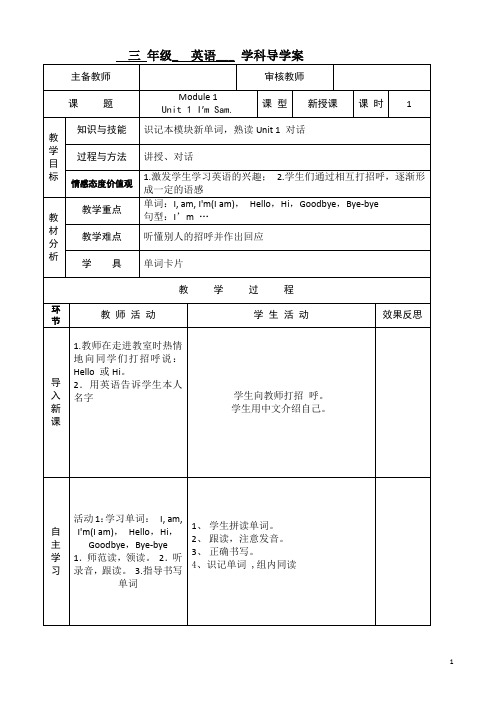
教学难点
听懂别人的招呼并作出回应
学具
单词卡片
教学过程
环节
教师活动
学生活动
效果反思
导
入
新
课
1.教师在走进教室时热情地向同学们打招呼说:Hello或Hi。
2.用英语告诉学生本人名字
学生向教师打招呼。
学生用中文介绍自己。
自
主
学
习
活动1:学习单词:I, am, I'm(I am),Hello,Hi,Goodbye,Bye-bye 1.师范读,领读。2.听录音,跟读。3.指导书写单词
Hello, I’m Sam.Hello, Sam.
Hello, I’m Amy.Hello, Amy.
I’m Lingling. Hello, Lingling.
Goodbye, Lingling. Byebye, Sam.
三年级_英语__学科导学案
主备教师
审核教师
课题
Module 1
Unit 1 I’m Sam.
Jiajia: __________, Lili.
作业设计
完成英语练习册P1、2.
板书设计
Module 1 Unit 1 I’m Sam
Hello, I’m -------用于自我介绍。
Goodbye,为告别时的习惯用语。还可以用Bye-bye
句子中首字母要大写,人名首字母大写。
拓
展
训
练
连线:
Hello, I’m Sam.你好,玲玲。.
Hello, I’m Amy.再见,大明。
Hi, Liping.再见,萨姆。
Goodbye, Daming.你好,我是萨姆。
2020九年级英语全册 Unit 1 How can we become good learners导学案
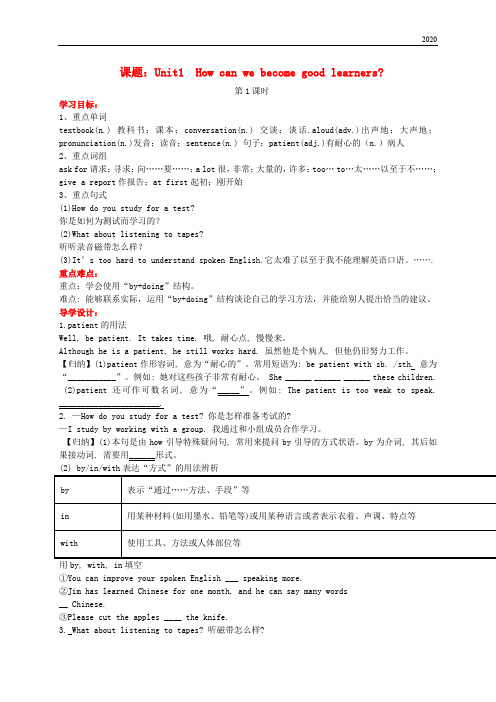
课题:Unit1 How can we become good learners?第1课时学习目标:1、重点单词textbook(n.) 教科书;课本;conversation(n.) 交谈;谈话.aloud(adv.)出声地;大声地;pronunciation(n.)发音;读音;sentence(n.) 句子;patient(adj.)有耐心的(n.)病人2、重点词组ask for请求;寻求;向……要……;a lot很,非常;大量的,许多;too… to…太……以至于不……;give a report作报告;at first起初;刚开始3、重点句式(1)How do you study for a test?你是如何为测试而学习的?(2)What about listening to tapes?听听录音磁带怎么样?(3)It’s too hard to understand spoken English.它太难了以至于我不能理解英语口语。
…….重点难点:重点:学会使用“by+doing”结构。
难点: 能够联系实际,运用“by+doing”结构谈论自己的学习方法,并能给别人提出恰当的建议。
导学设计:1.patient的用法Well, be patient. It takes time. 哦, 耐心点, 慢慢来。
Although he is a patient, he still works hard. 虽然他是个病人, 但他仍旧努力工作。
【归纳】(1)patient作形容词, 意为“耐心的”。
常用短语为: be patient with sb. /sth. 意为“___________”。
例如: 她对这些孩子非常有耐心。
She ______ ______ ______ these children.(2)patient还可作可数名词, 意为“_____”。
例如: The patient is too weak to speak. _______________________.2. —How do you study for a test? 你是怎样准备考试的?—I study by working with a group. 我通过和小组成员合作学习。
Unit1 Vocabulary(教案(人教版必修三)

(高一)年级(英语)学科教学案授课班级:____ 姓名________ 课时__1-2____ 日期______设计者:高一年级组课题名称:_模块三Unit1 Festivals around the world(Vocabulary)教师寄语:No pains, no gains. 没有付出,没有收获.【自研课导学】自研内容及目标:1、鼓励学生自己先试着掌握新词汇读法,然后小组同学之间进行纠音;最后巩固词汇记忆2、在自学的过程中,若遇到自己不会读的单词,请做上记号。
课型设置:【自研·互动+ 展示】【展示课导学】(一)学习目标:通过本单元学习:1.能够使学生对本单元词汇形成正确的读音。
2.能够使学生对本单元重点词汇进行记忆与理解,并学会在练习中加以正确应用。
词汇讲评:1、celebration (n.) / celebrate (v.)/ celebrated (adj.)著名的/ celebrity (n) 名人;名声[辨析] celebrate / congratulatecelebrate sth. 庆祝某事have/ hold a celebration 举行庆祝会in celebration of 为了庆祝congratulate sb. on (doing) sth.祝贺某人做某事/ congratulations to sb. on (doing) sth.E.g. We celebrated New Year with a party.We congratulated him on having passed the examination.2、hunter / hunt / huntinghunt for = look for = in search of = search for3、starve / starvation / starvingstarve to death = be starved to death =die of starvation/hunger饿死starve for sth. = be starved of sth. = be dying for sth. = be eager for sth. =be anxious for = long for = be in great need of 渴望/迫切需要某物。
Unit 1分层导学案 2021--2022学年八年级英语下册

班级:姓名:____________Unit 1 What’s the matter?Section A(1a—2d)第一课时主备人:王*庆【学习目标】知识目标:掌握本节的生词和句型。
能力目标:能够听懂医生和病人之间的对话。
知识目标:掌握本节的生词和部分重点句型。
---What’s the matter? ---I have a stomachache.---What’s the matter with you? ---I cut myself.能力目标:能模仿医生和病人之间的对话。
知识目标:掌握本节的生词和重点句型。
---What’s the matter? ---I have a toothache.---What should I do? ---You should drink some hot tea with honey.能力目标:能够扮演医生或者病人的角色进行语言演练。
【课前热身】任务一:请写出下面的身体部位名词胳膊___ 耳朵___ 后背___ 眼睛___ 脚___ 手___ 头___腿_____ 嘴巴___ 脖子_____ 鼻子_____ 胃部_____ 牙齿_____任务二:1. have a toothache2. have a stomachache3. have a backache4. have a headache5. h ave a sore throat6. have a fever7. have a cold 8. lie down and rest9. drink hot tea with honey 10. drink lots of water11. see a dentist 12. take one’s temperature13. go to a doctor你怎么了?我头疼/胃疼/牙疼。
________________? _____________________.【听课疑问】(请同学将听课中自己的问题和不清楚的地方及时记在导学案上)问题1:问题2:【教师答疑】【当堂检测】I.根据句意及汉语提示写出所缺的单词1.Lisa didn't go to school because she had a ________ (头痛).2.3.The man had a ________ (咳嗽) last night, so he didn't sleep well.4.I'm not feeling well. I have a ________ (胃痛).5.hen you have a ________(发烧), you should go to a doctor.6.Go and ________ (躺) down for a while.II.用括号内的适当形式填空。
Unit1+导学案++2023-2024学年人教版七年级英语下册
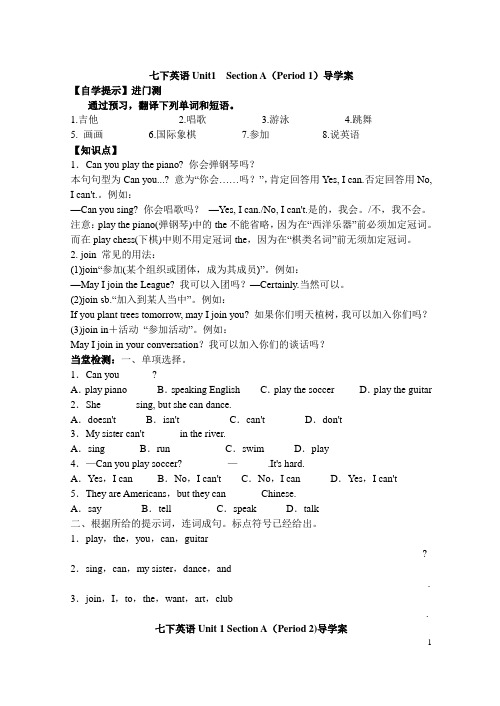
七下英语Unit1 Section A(Period 1)导学案【自学提示】进门测通过预习,翻译下列单词和短语。
1.吉他______________2.唱歌_________3.游泳_________4.跳舞_________5. 画画_______6.国际象棋_______7.参加__________8.说英语_____________ 【知识点】1.Can you play the piano? 你会弹钢琴吗?本句句型为Can you...? 意为“你会……吗?”,肯定回答用Yes, I can.否定回答用No, I can't.。
例如:—Can you sing? 你会唱歌吗?—Yes, I can./No, I can't.是的,我会。
/不,我不会。
注意:play the piano(弹钢琴)中的the不能省略,因为在“西洋乐器”前必须加定冠词。
而在play chess(下棋)中则不用定冠词the,因为在“棋类名词”前无须加定冠词。
2. join 常见的用法:(1)join“参加(某个组织或团体,成为其成员)”。
例如:—May I join the League? 我可以入团吗?—Certainly.当然可以。
(2)join sb.“加入到某人当中”。
例如:If you plant trees tomorrow, may I join you? 如果你们明天植树,我可以加入你们吗?(3)join in+活动“参加活动”。
例如:May I join in your conversation?我可以加入你们的谈话吗?当堂检测:一、单项选择。
1.Can you ______?A.play piano B.speaking English C.play the soccer D.play the guitar 2.She ______ sing, but she can dance.A.doesn't B.isn't C.can't D.don't3.My sister can't ______ in the river.A.sing B.run C.swim D.play4.—Can you play soccer? —______.It's hard.A.Yes,I can B.No,I can't C.No,I can D.Yes,I can't 5.They are Americans,but they can ______ Chinese.A.say B.tell C.speak D.talk二、根据所给的提示词,连词成句。
Unit 1 导学案
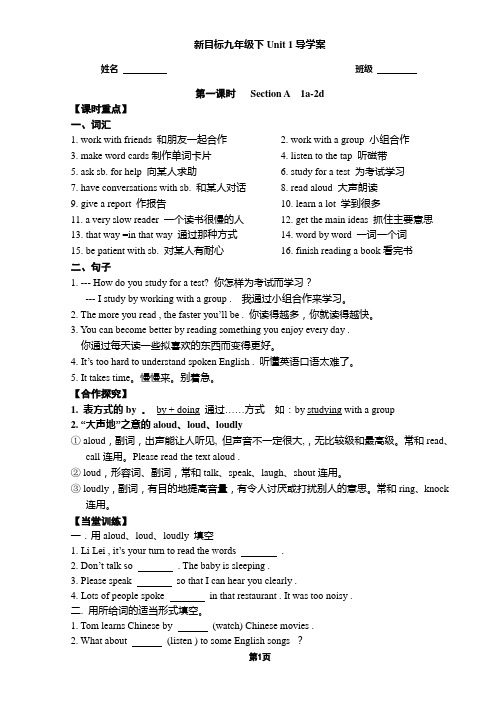
第一课时Section A 1a-2d【课时重点】一、词汇1. work with friends 和朋友一起合作2. work with a group 小组合作3. make word cards制作单词卡片4. listen to the tap 听磁带5. ask sb. for help 向某人求助6. study for a test 为考试学习7. have conversations with sb. 和某人对话8. read aloud 大声朗读9. give a report 作报告10. learn a lot 学到很多11. a very slow reader 一个读书很慢的人12. get the main ideas 抓住主要意思13. that way =in that way 通过那种方式14. word by word 一词一个词15. be patient with sb. 对某人有耐心16. finish reading a book看完书二、句子1. --- How do you study for a test? 你怎样为考试而学习?--- I study by working with a group . 我通过小组合作来学习。
2. The more you read , the faster you’ll be . 你读得越多,你就读得越快。
3. You can become better by reading something you enjoy every day .你通过每天读一些拟喜欢的东西而变得更好。
4. It’s too hard to understand spoken English . 听懂英语口语太难了。
5. It takes time。
慢慢来。
别着急。
【合作探究】1. 表方式的by 。
by + doing 通过……方式如:by studying with a group2. ―大声地‖之意的aloud、loud、loudly① aloud,副词,出声能让人听见, 但声音不一定很大,,无比较级和最高级。
北师大版高一英语必修第三册(2019版)Unit1_SectionⅥ精品导学案
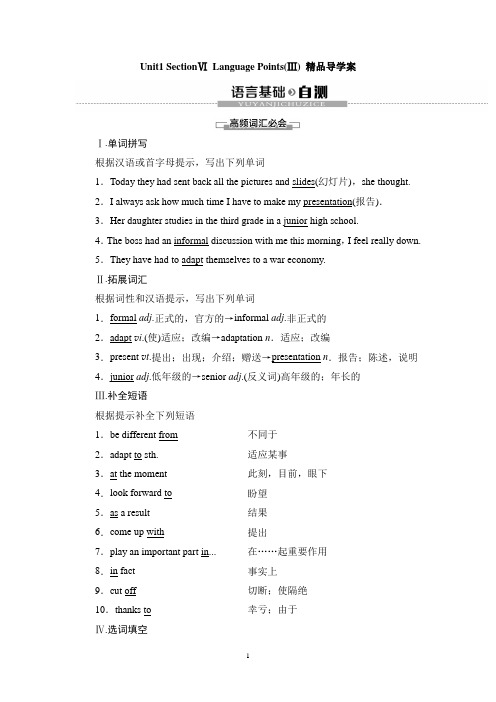
Unit1 SectionⅥLanguage Points(Ⅲ) 精品导学案Ⅰ.单词拼写根据汉语或首字母提示,写出下列单词1.Today they had sent back all the pictures and slides(幻灯片),she thought. 2.I always ask how much time I have to make my presentation(报告).3.Her daughter studies in the third grade in a junior high school.4.The boss had an informal discussion with me this morning,I feel really down. 5.They have had to adapt themselves to a war economy.Ⅱ.拓展词汇根据词性和汉语提示,写出下列单词1.formal adj.正式的,官方的→informal adj.非正式的2.adapt v i.(使)适应;改编→adaptation n.适应;改编3.present v t.提出;出现;介绍;赠送→presentation n.报告;陈述,说明4.junior adj.低年级的→senior adj.(反义词)高年级的;年长的Ⅲ.补全短语根据提示补全下列短语1.be different from不同于2.adapt to sth. 适应某事3.at the moment 此刻,目前,眼下4.look forward to 盼望5.as a result 结果6.come up with 提出7.play an important part in... 在……起重要作用8.in fact 事实上9.cut off 切断;使隔绝10.thanks to 幸亏;由于Ⅳ.选词填空选用上述短语的适当形式填空1.Thanks to the bad weather,the match had been cancelled. 2.He came up with good ideas for the product promotion. 3.He quickly adapted to the climate in the high mountains. 4.At the moment he doesn't have a penny to his name. 5.We look forward to welcoming you and your party. 6.The floods have cut off our supplies.[寻规律、巧记忆]v.+-ation→n. v.+off→动词短语imagination想象explanation解释simplification简化put off取消turn off关set off出发背教材原句记句式结构仿写促落实1.In the 18th and 19th centuries,mostEnglish people ate only two main mealseach day-breakfast in the morning and alarge supper which usually wasn't served until seven o'clock in the evening.在18世纪和19世纪,大部分英国人每天吃两顿饭,早晨的早餐和直到晚上七点才吃的晚饭。
- 1、下载文档前请自行甄别文档内容的完整性,平台不提供额外的编辑、内容补充、找答案等附加服务。
- 2、"仅部分预览"的文档,不可在线预览部分如存在完整性等问题,可反馈申请退款(可完整预览的文档不适用该条件!)。
- 3、如文档侵犯您的权益,请联系客服反馈,我们会尽快为您处理(人工客服工作时间:9:00-18:30)。
Unit 1 Festivals around the world单词导学案1. take place 发生举行(不及物动词,无被动语态,无进行时态)The football match _________________________tomorrow. 足球赛明天举行。
No one knows __________________(发生过什么) that night.辨析:take place & happen & come about1) take place 常指某事按规律、预先安排或计划而发生或进行;2) happen常指客观事物或情况偶然、不可预料地发生,和不定式连用时,表示“碰巧发生”;3) come about 常与疑问词how连用,侧重事情发生的过程。
When the accident __________(发生), It __________(碰巧) that a wedding ceremony _____________ (举行) then. So people went to help the injured and called the police.Now the police are look into ______ it _________ (事情是如何发生的).拓展:与place有关的短语:take one’s place= take the place of sb 代替某人in place of sb = in on e’s place 代替某人in place 在正确的位置;准备就绪out of place 位置不当;不得体,不适当2. religious adj. 宗教上的,信奉宗教的;虔诚的religious beliefs ___________ religious groups _____________3. in memory of 纪念;追念She wrote a poem _______________________________.(纪念那些在地震中死去的人们) 拓展:1) 具有in +n. +of 结构的短语:为了纪念_____________ in praise of _____________ 寻找_____________负责管理______________ 代替_____________ in need of __________in favor of = in support of _____________2) 与memory 有关的短语:have a good / bad memory for … (不)善于记…并非每个人都善于记忆英语单词。
___________________________________________ 4. belief n.1) (U) 相信,信心,看法have belief in…相信…beyond belief 难以置信The players all ________________ (相信) their coach.__________________________________. 她的故事令人难以置信。
She acted in the belief that she was doing good._______________________________ 2) (C) 信仰宗教信仰________________5. dress up 穿上盛装;打扮;装饰Do we ______________________________ to visit her birthday party?去参加她的生日宴会,我们得打扮打扮吗?dress sb up as…把…打扮成…他把自己打扮成一个警察。
_____________________________________The whole family are ___________________________(装饰新房子).拓展:dress sb/ oneself 给某人穿衣服be dressed in…穿着…dress well /badly _____________6. trickn. 鬼把戏,诡计;恶作剧;窍门Pretending he doesn’t remember is an old trick of his. _________The trick is to bent your knees as you catch the ball. __________People play tricks on each other on April Fool’s Day. ____________________→短语:____________________vt. 欺骗,欺诈trick sb into doing sth 诱使某人做某事=cheat sb into doing sth= fool sb into doing sth trick sb out of sth 骗取某人某物= cheat sb out of sthHe tricked me into ________(lend) him$100.She was tricked ___________ her life savings.拓展:make fun of …make a fool of sb. play a joke on sb7. gain vt. 获得,得到gain experience /confidence /independence_____________gain one’s respect ______________ gain weight ___________My watch gains/ loses 2mintues a day. _____________8. gather vt. & vi 搜集;集合;聚集vi. A crowd soon gathered.____________________vt. He is gathering fallen leaves._______________________短语:gather around 围拢gather together 聚集gather in the harvest 收获收割gather sth up 收拾…It’s a tradition custom for Chinese to _______________ during the Spring Festival. On the evening of the New Year, the whole family _____________ the TV and enjoy theFestival Gala.gather one’s strength/ thoughts/courage ______________ gather oneself ____________ 9. awardn. 奖,奖品win/ get an award for…因为…而获奖Dr. Y uan Longping has _________________________ his research.因为研究袁隆平博士获了很多的奖vt. award sb sth = award sth to sb 奖励某人某物,授予…他把金牌授予获胜者。
__________________________. _______________________.辨析:award, reward与prizeaward 侧重指经过正式裁定而给予的荣誉或在某项评比竞赛中获胜而得到的奖赏。
reward 侧重指对某人所做的某件好事、好的行为等的报答、酬谢。
prize 多指在竞赛中获胜或有特殊贡献时所得的奖励。
1) She won the first ________ in the 100-meter race.2) We will offer a _________ of ten thousand dollars for information about the case.3) His movie won several _______ at the film festival.10. admire vt. 赞美;钦佩;羡慕;欣赏1) We stopped to admire the view. ________2) I admire your courage. _______短语:admire sb. for ….. 因为…赞赏/钦佩…The school is widely _________ for its excellent teaching.11. look forward to 期望;期待;盼望(to为介词)1) Children are looking forward to the Spring Festival. 孩子们渴盼着过年。
2) He’s looking forward to______( hear ) from his pen pal. 他期待着笔友来信。
拓展:1) 与look有关的短语:look after __________ look back on ____________ look down on/upon _______look into ___________ look on… as… ___________ look through ___________look around/about___________ look out for ___________ look up ___________look up to __________2) 含有介词to 的短语:lead to _________ be/get used to _________ pay attention to ________be addicted to ___________ stick to ________ object to ___________get down to _________ be accustomed to _________ be devoted to __________12. day and night 日夜;昼夜;整天13. as though/if 好像可引导表语从句和方式状语从句(1) 引导表语从句It looks _______________________看样子天要下雨了。
